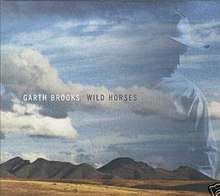Wild Horses (Garth Brooks song)
| "Wild Horses" | ||||
|---|---|---|---|---|
 | ||||
| Single by Garth Brooks | ||||
| from the album No Fences | ||||
| Released | November 20, 2000 | |||
| Format | CD Single | |||
| Recorded |
1990 (instruments) 2000 (vocals) | |||
| Genre | Country | |||
| Length | 3:08 | |||
| Label | Capitol Nashville | |||
| Songwriter(s) | Bill Shore, David Wills | |||
| Producer(s) | Allen Reynolds | |||
| Garth Brooks singles chronology | ||||
| ||||
"Wild Horses" is a song co-written by Bill Shore and David Wills, recorded by American country music artist Garth Brooks on his breakthrough album No Fences in 1990. The song was not released as a single until November 2000, when it was released with a re-recorded vocal track.[1] It peaked at #7 on the Billboard Hot Country Singles & Tracks chart.
Content
On the surface, this song is about a cowboy's struggle between the love of the rodeo life and the love of a woman. He repeatedly promises to her that he will quit riding, but repeatedly breaks these promises because "wild horses keep dragging [him] away." As the song progresses he's preparing to "make her one more promise that [he] can't keep." It can be interpreted to be about a man who is repeatedly unfaithful and is forgiven, but knows his significant other will eventually stop forgiving him ("The way I love the rodeo / I guess I should let her go / before I hurt her more than she loves me").
Chart performance
| Chart (2000–2001) | Peak position |
|---|---|
| US Hot Country Songs (Billboard)[2] | 7 |
| US Billboard Hot 100[3] | 50 |
Year-end charts
| Chart (2001) | Position |
|---|---|
| US Country Songs (Billboard)[4] | 40 |
References
- ↑ "Celebrating Garth, country's new king". tennessean.com. Retrieved April 26, 2017.
- ↑ "Garth Brooks Chart History (Hot Country Songs)". Billboard.
- ↑ "Garth Brooks Chart History (Hot 100)". Billboard.
- ↑ "Best of 2001: Country Songs". Billboard. Prometheus Global Media. 2001. Retrieved August 14, 2012.
External links